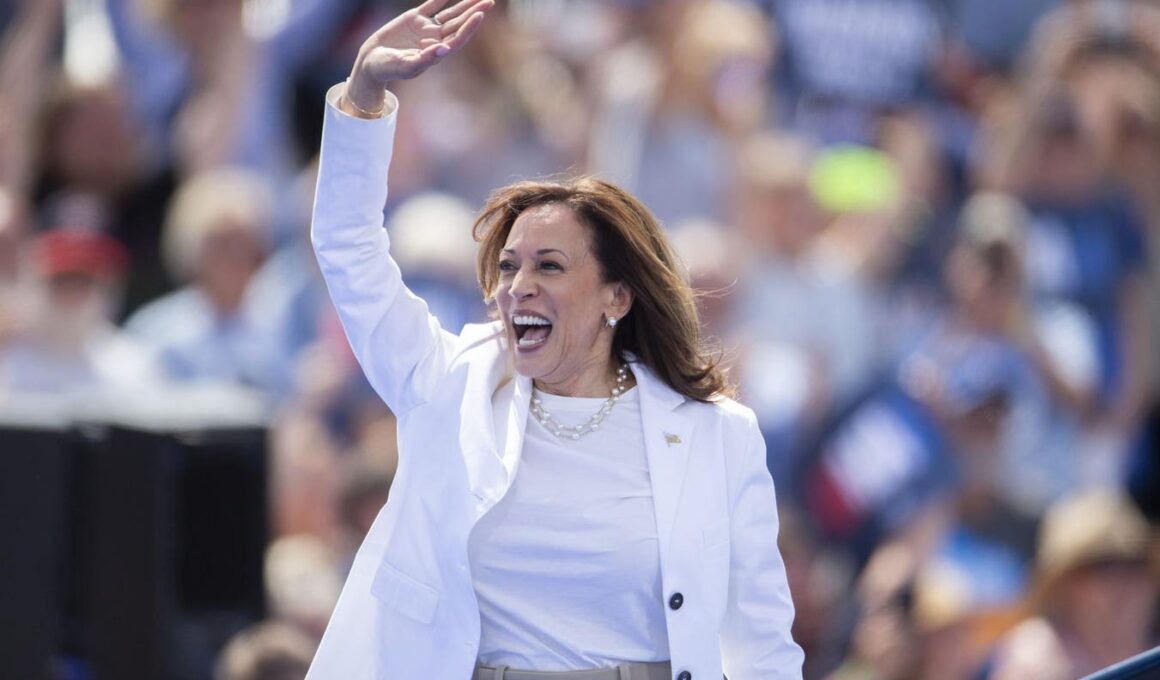Topline
Polls continue to show Vice President Kamala Harris leading former President Donald Trump since becoming the official Democratic presidential nominee—with the latest Reuters/Ipsos survey showing Harris up by five points.
Vice President Kamala Harris attends her and Governor Tim Walz’s presidential campaign rally at the … [+]
Key Facts
A Reuters/Ipsos poll released Thursday found Harris leads 42% to 37% when voters are allowed to say they don’t know who they’ll vote for, a shift from Harris’ 37%-34% lead in late July—but the lead shifts to just 49%-47% in Harris’ favor when voters who are unsure are pressured to answer.
A YouGov/Economist survey released Wednesday also found Harris is up two points, 45% to 43%, with third-party candidates, including independent Robert F. Kennedy Jr., on the ballot (voters were also given the option to chose other, say they wouldn’t vote or weren’t sure).
Harris built a three-point lead over Trump in a NPR/PBS News/Marist poll released Tuesday, polling 48% to 45% over Trump, though with a margin of error of 3.3 points, Trump remains in striking distance, while independent candidate Robert F. Kennedy Jr. falls well behind at 5%.
The vice president leads Trump 48% to 44% in Morning Consult’s latest poll released Monday, with 5% of registered voters surveyed selecting “someone else” and 4% saying they don’t know—the third week in a row Morning Consult’s weekly poll has shown Trump trailing Harris.
Harris also leads Trump by one point nationally in a CBS News poll released Sunday, in part because younger and Black voters said they’re more likely to vote and women indicated they believe Harris would favor their interests more (margin of error 2.1 points).
The CBS News poll—which was conducted July 30 through Aug. 2—also found Trump and Harris are locked in a tie among voters across the seven top battleground states (Michigan, Pennsylvania, Arizona, Wisconsin, Georgia, North Carolina and Nevada).
Trump leads Harris in at least eight other polls since President Joe Biden dropped out of the race, but most show her denting Trump’s lead over Biden and her approval rating ticking up since she announced her candidacy.
Trump led Harris by one point (48% to 47%) in a New York Times/Siena poll conducted July 22-24, two points (49% to 47%) in a July 23-25 Wall Street Journal poll and by two points (47% to 45%) in a HarrisX/Forbes online survey released June 26.
Big Number
0.5. That’s how many points Harris leads Trump by in RealClearPolitics’ latest polling average. Meanwhile, FiveThirtyEight’s weighted average shows Harris with a two-point lead.
Surprising Fact
The New York Times/Siena poll found voters are more tuned into the race in the aftermath of the June 27 Biden-Trump debate, which was widely considered disastrous for Biden. Some 64% percent of respondents now say they’re paying a lot of attention to the contest, compared to 48% prior to the debate.
How Does Harris Perform Against Trump In Swing States?
Harris leads Trump by one point overall in the seven battleground states likely to decide the election: Michigan, Pennsylvania, Wisconsin, Nevada, Arizona, North Carolina and Georgia, according to a July 24-28 Bloomberg/Morning Consult poll. Harris is ahead in Michigan, Wisconsin, Arizona and Nevada; Trump leads in Pennsylvania and North Carolina; and the two are tied in Georgia.
Tangent
Democrats are far more enthusiastic about Harris than they were about Biden, the Times/Siena survey found, with nearly 80% of voters who lean Democratic saying they would like Harris to be the nominee, compared to 48% of Democrats who said the same about Biden three weeks ago. In a stark contrast with sentiment surrounding Biden’s mental fitness, 56% of voters polled by Reuters/Ipsos said Harris was “mentally sharp and able to deal with challenges,” compared to 49% who said the same about Trump and 22% for Biden. A 19th News/SurveyMonkey poll found 87% of Americans agreed with Biden’s decision to end his campaign, and more Americans think the decision will help the Democratic Party (45%) than the Republican Party (29%). The 19th News survey also showed Americans are split on whether Harris’ gender and race will help or hurt her: 31% think being a woman will help her, compared to 33% who think it will hurt her and 34% who see no impact. Respondents were more optimistic that Harris being Black and Indian American will benefit her, with 32% seeing it as helpful compared to 24% seeing it as harmful—though 41% expected it to have no impact.
Contra
Trump campaign pollster Tony Fabrizio predicted a “short term” bump in polls for Harris in the coming weeks as her entrance into the race is expected to reenergize Democrats, referring to the anticipated boost as a “Harris Honeymoon,” in a memo released shortly after the Reuters/Ipsos poll was made public.
Key Background
Biden dropped out of the race on July 21 after earlier resisting growing calls from within his own party to end his reelection bid in the wake of his disastrous performance in the June 27 debate. Biden immediately endorsed Harris and she announced plans to seek the nomination. The party has quickly coalesced around her, with all Democratic governors and the majority of Democrats in Congress backing her. She has effectively clinched the Democratic nomination as more than half of all delegates have announced plans to formally vote to nominate her—something the party is expected to do in the first week of August. An ABC News/Ipsos poll taken July 26-27 found Harris’ favorability rating has increased to 43%, from 35% in the groups’ previous poll taken July 19-20, while Trump’s favorability rating stands at 36% and Biden’s is at 37%.
Further Reading
Trump’s Lead Over Biden And Harris Jumped After RNC, HarrisX/Forbes Poll Finds (Forbes)
Here’s How Kamala Harris Performs In Polls Against Trump—As Biden Drops Out And Endorses Harris (Forbes)
2022 midterms, 2024 presidential campaign, the January 6 House committee investigation, former House Speaker Kevin McCarthy’s historic ouster, the 2023 State of the Union Address, former President Donald Trump’s federal election interference and classified documents cases and his Manhattan hush money case. Dorn graduated in 2012 from the University of Dayton with a degree in journalism. Prior to joining Forbes, she covered New York City and state politics for the New York Post and City and State magazine. Follow her for updates and analysis on the 2024 presidential race, key Senate and House races and developments in Congress and at the White House.
“>






